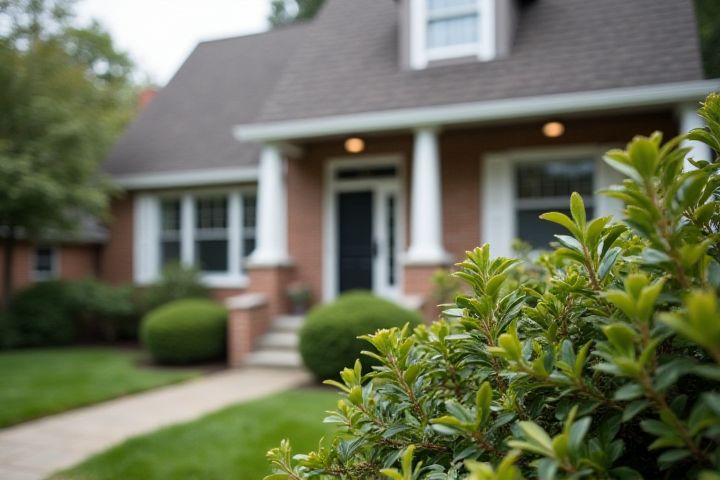
A house inspection is crucial before purchasing a property to identify potential issues that could lead to costly repairs. Engaging a certified home inspector can help reveal hidden problems such as electrical faults, plumbing leaks, or structural damage. This evaluation provides you with a clear understanding of the property's condition, allowing for informed negotiation on the asking price. By addressing these findings early, you can avoid unexpected expenses and ensure the home meets safety standards. Investing in a thorough inspection not only protects your financial interests but also enhances peace of mind as you make this significant commitment.
Should House Be Inspected
Foundation stability
Foundation stability is crucial for your home's overall structural integrity and long-term durability. A professional inspection can reveal issues like cracks, settling, or moisture intrusion, which might undermine the foundation. Detecting these problems early can save significant repair costs and ensure a safe living environment. Prioritizing foundation inspection during the home-buying process or regular maintenance checks protects your investment and enhances property value.
Roof condition
A thorough home inspection should prioritize the roof condition due to its critical role in protecting the entire structure. Inspectors assess various elements, including shingle wear, flashing integrity, and the presence of leaks or mold. Your roof's lifespan can significantly affect future maintenance costs, with asphalt shingles typically lasting 20 to 30 years and metal roofs often exceeding 50 years. Investing in a detailed roof inspection not only safeguards against immediate repair needs but also enhances your home's value and longevity.
Electrical systems
Electrical systems in a house should be prioritized during inspections, as they are crucial for safety and functionality. Statistics indicate that faulty wiring is responsible for over 50,000 house fires annually in the United States. A thorough examination involves checking for outdated systems, proper grounding, and code compliance, ensuring that amperage ratings align with your household needs. Investing in an electrical inspection can save you from potential hazards, reduce energy costs, and enhance the overall value of your property.
Plumbing integrity
A thorough plumbing inspection can reveal critical issues that may compromise your home's integrity, such as leaks, corrosion, and outdated piping systems. Approximately 10% of homes experience significant plumbing problems that can lead to costly repairs if not addressed early. Inspectors examine components like water heaters, pipes, and drainage systems to ensure they meet current safety standards. Ensuring plumbing integrity not only safeguards your property but also enhances overall home value and provides peace of mind for you and your family.
HVAC functionality
Prioritizing HVAC functionality in a house inspection is crucial for ensuring optimal indoor air quality and energy efficiency. An effective HVAC system can significantly influence your comfort and overall health, as it regulates temperature and filters airborne pollutants. Inspecting components such as the furnace, air conditioner, and ductwork helps identify potential inefficiencies or repairs needed, ultimately saving you money on energy bills and maintenance costs. Ensuring your HVAC system operates smoothly enhances the longevity of the equipment and contributes to a healthier living environment.
Pest infestation signs
When inspecting a house, identifying pest infestation signs is crucial for safeguarding your investment. Common indicators include droppings, gnawed wood, and visible nests, which signal potential damage and health risks. Nearly 14% of homes in the U.S. experience some form of pest issue annually, making inspections a vital step before purchase. By recognizing these signs early, you can avoid costly repairs and ensure a healthier living environment.
Structural integrity
Inspecting a house for structural integrity is crucial to ensure the safety and longevity of the building. Key elements include evaluating the foundation, framing, and load-bearing walls, which collectively support the overall stability. Signs of structural issues, such as cracks in walls or uneven floors, can indicate potential problems that may require significant repairs. By prioritizing structural integrity during an inspection, you can make informed decisions about necessary maintenance or renovations, ultimately protecting your investment and enhancing your living environment.
Mold and mildew presence
House inspections should prioritize the presence of mold and mildew, as these fungi can pose serious health risks and indicate underlying moisture problems. Mold can grow on various surfaces, with common areas including basements, bathrooms, and kitchens--especially in humid environments. Statistics reveal that over 50% of homes have some form of mold, which can lead to respiratory issues, allergies, and other health complications. By identifying these issues early through thorough inspections, you can protect your health and save on potentially expensive remediation costs.
Insulation and ventilation
House inspections should prioritize insulation and ventilation because they significantly impact energy efficiency and indoor air quality. Proper insulation reduces heat loss in winter and keeps homes cool during summer, thus lowering energy bills and enhancing comfort. Effective ventilation ensures a steady flow of fresh air, helping to prevent moisture buildup and mold growth, which can lead to health issues. Ensuring these systems are up to standard can increase the longevity of your home's structure and create a healthier living environment for you and your family.
Safety compliance standards
A comprehensive house inspection should prioritize safety compliance standards to ensure your living environment adheres to local regulations. Key areas of focus include electrical systems, plumbing, and structural integrity, where outdated or faulty components can pose significant hazards. Inspectors often use a detailed checklist, assessing features like wiring age, the presence of carbon monoxide detectors, and the condition of handrails and staircases. Investing in a safety-focused inspection reduces risks and can enhance property value by guaranteeing that your home is safe and compliant with necessary codes.
